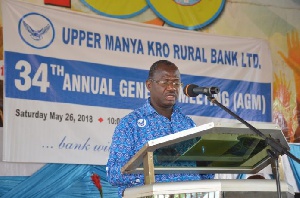The Upper Manya Kro Rural Bank’s profit for 2017 has hit GHC 1,238, 622 – representing a 12.3 percent increase over the previous year, the bank’s annual report has stated.
The total equity of the bank also increased, from GH?5,947,280 to GH?6,802,316 within the same period, whereas cash flow from operations hit GHC 3,032,237.
Total assets recorded a 14.1 percent rise, from GH?42.6million in 2016 to GHC 48.6million in 2017.
Income surplus also recorded a 14.1 percent growth from GH?2.62million to GH?2.99million within the one-year period.
And shareholders’ funds also grew, by 14.3 percent from GH?5.95million to GH?6.8million.
The bank also committed GH?52,891 to its corporate social responsibility in areas of help, education and agriculture, among others.
Commenting on the above performance, Chairman of the Board James Kwame Otieku said it was the result of hard work from the staff and management, as well as loyal customers of the bank, that led to this growth.
“We appreciate our cherished customers for remaining loyal to the bank, and that is why we will continue to devote all our energies to serving them diligently. The commitment of management and staff to the cause of this bank is well-acknowledged and will always be well-rewarded,” he said.
Speaking at the bank’s Annual General Meeting, President of the Association of Rural Banks D.O.K. Owusu, congratulated the bank for its performance and showing resilience in the sector over the past years, urging it to keep up this effort.
“The bank has been recording satisfactory ratings over 2017 as assessed by the ARB Apex Bank, while the operations for 2017 achieved modest growth in the key performance indicators. I hope that prudent management and the board will provide an impetus for the accelerated and robust growth of the bank,” he said.
He further urged rural banks to embrace and make use of technology if they want to stay relevant in the industry, as technology is now the main driver of all economies.
Mr. Owusu, however, cautioned rural banks to maintain good loan portfolio quality by strengthening their loan appraisal methodology.
“Obtain credit referencing reports on loan applicants to guide in taking appropriate credit decision; register immovable properties pledged as collateral with the Collateral Registry, to ease forecasting the underlying collateral should there be defaults and delinquencies; monitor utilisation of the funds approved and ensure regular supervision by field visits to customers,” he said.
Mr. Owusu is also advocating capacity building workshops for management and staff of banks so that they will be abreast with changing trends in the industry.
“The required training should be availed to directors, management, staff and customers of rural banks to make them effective in embracing any relevant refined ideas and skills,” he added.
Business News of Thursday, 31 May 2018
Source: thebftonline.com













